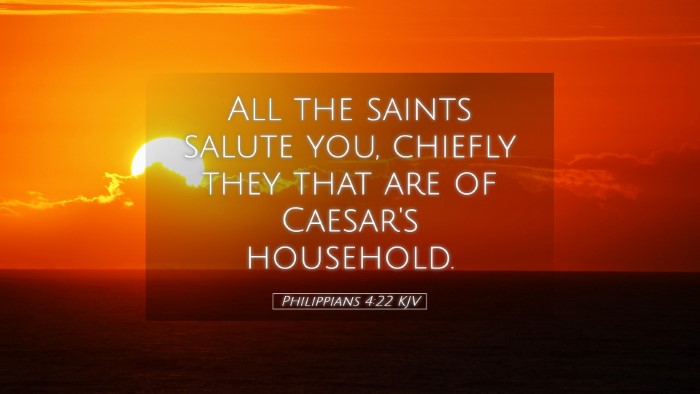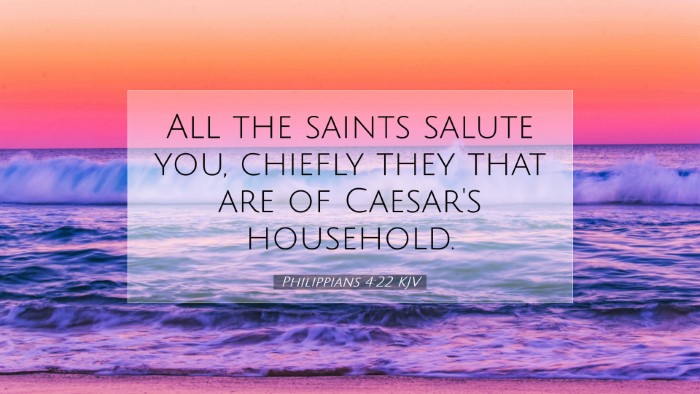Philippians 4:22 - Commentary Insights
Verse: "All the saints greet you, especially those of Caesar's household."
Introduction
Philippians 4:22 emerges as a profound conclusion to Paul's epistle to the church at Philippi, punctuating his affection for the believers and emphasizing the shared faith among the early Christian community, even within the heart of the Roman Empire. This verse is significant for pastors, students, theologians, and Bible scholars as it encapsulates the interconnectedness of believers across different societal standings.
Overview of the Verse
This closing remark from Paul reveals that the greetings he sends are not solely from the apostle himself but also from the broader community of saints, particularly highlighting those who are part of Caesar's household. The mention of “the saints” serves to unify the body of Christ, while the specificity of Caesar's household introduces a rich context about the spread of the Gospel even in imperial circles.
Historical Context
Paul's incarceration in Rome is crucial to understanding this moment. As he awaited trial, Paul engaged in ministry with anyone who would listen, including individuals from the households of those in authority. The mention of saints from Caesar's household conveys the revolutionary nature of the Gospel, making inroads into the highest societal levels.
Thematic Explorations
1. Unity in Christ
Paul’s greeting emphasizes the unity among believers. Matthew Henry notes that the apostles valued mutual encouragement and support within the Christian community. The collective greeting illustrates that, regardless of background or status, all saints stand united by their faith in Christ.
2. The Boldness of the Gospel
Albert Barnes points out the significance of the gospel's reach into Caesar's household. This underscores not only the power of the Gospel message but also the fearlessness with which early Christians proclaimed their faith, even amidst potential persecution. This aspect serves as an encouragement to modern believers to share their faith boldly.
3. The Nature of Christian Greetings
Adam Clarke elaborates on the nature of greetings in the early church. Each greeting from the saints conveys a sense of fellowship and guardianship within the Christian family. The act of greeting one another reflects commitment to the community and the shared mission of spreading the Gospel.
Theological Implications
1. The Universal Church
This verse highlights the universal nature of Christianity. While Philippi was a distinct geographic and cultural entity, the inclusion of Caesar's household demonstrates that the Church transcends national and social boundaries. The challenge for today’s church is to recognize and embrace this universality.
2. Impact of Faith in High Places
The fact that disciples were found in Caesar's household may suggest a theologically profound message: that God's influence reaches every aspect of society, including political power. This insight invites believers to examine how they can be conduits of faith in their respective spheres of influence.
3. Community and Support
Paul's mention of greetings from the saints serves as a reminder that no believer stands alone. The church is called to be a supportive network, uplifting one another in fellowship and faith. This encourages modern congregations to strengthen community ties and collectively uplift those in their community.
Personal Applications
For contemporary readers, particularly pastors and church leaders, this verse can invoke several applications:
- Encouragement to Foster Community: Pastors should emphasize the importance of community within their congregations, encouraging members to greet and support one another as part of their Christian duty.
- Promoting Unity: It is crucial to advocate for unity among diverse groups within the church, recognizing the need for mutual respect and cooperation across varied backgrounds and experiences.
- Pursuing Evangelism: The influence of faith in high places can inspire believers to share the Gospel fearlessly in their workplaces and social circles, emulating the example set by the early Christians.
Conclusion
Philippians 4:22 serves as a powerful reminder of the early church's connectivity and impact. The final greetings highlight the unbreakable bond of the Christian community, encouraging believers to remain engaged, unified, and bold in their witness for Christ. This verse is intended not just as a historical note but as a resounding call to action for Christians today, inviting them to recognize and embrace their role within the universal body of Christ.


